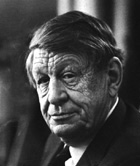If I Could Tell You Poem by Wystan Hugh Auden
If I Could Tell You
The text of this poem could not be published because of Copyright laws.
Daniel Barenboim, at the start of this year's Reith Lectures, reminded his audience that it is not possible to talk about music - only people's reactions to music. Sometimes I think that this is also true about literature - especially literature which uses words with the intensity Auden manages in this poem. If asked, 'What is this poem about? ' I'd answer something like: 'The fearfulness of unknowable inevitability.' For me, it is a poem which touches on the limitation of human reasoning, which asks unanswerable questions while longing for certainty, which expresses an 'existential angst'. But above all, it is a love poem. Let me start with the uncertainty. Two other 'If' poems come to mind - 'If I should die' and Kipling's, 'If'. What is noticeable about both these is the certainty of them: Things will happen, states of being will come into existence, under certain conditions. Both go, If: Then! There is a 'knowableness' here. We can predict the future; Cause and Effect are in observable operation. In contrast, Auden's 'If' leads to 'would' - and the unspoken, 'But I can't'. It expresses an unfulfillable desire. I think this is most clearly stated in the third stanza. What is wanted here is knowledge - of the future, of 'fortunes'. This suggests not just what will happen, but how good (or bad) will it be? An image, of Adam and Eve, came to me while thinking of this stanza - of Adam saying these lines to Eve, and Eve popping off to grab 'the fruit of knowledge' in order to satisfy both their desires. If I can pass beyond the superficiality of this (and it makes me smile, I must admit) , the 'tree of knowledge' myth does reflect a deep, possibly genetically pre-programmed, desire in all humanity for a patterned, readable, knowable existence. Our Human curiosity demands answers. The fourth stanza tackles a couple of these demands: 'Where does the wind come from? ' And: 'Why do leaves decay? ' Human 'reason' can take us so far - scientific answers can be given about the physical world - but Auden doesn't seem to mean this sort of answer when he posses questions of origins and reasons: His is a metaphysical demand. The fifth stanza has moved firmly beyond 'realism' - we have roses with wants, and visions becoming manifest. Except, we don't. We have a 'Perhaps' at the start. And I 'hear' a tenderness in the tone of voice - especially in the last line repetition of the 'if I could, I would' sentiment. This is, after all, a 'Love Poem'. One of the forces behind it is the desire to satisfy a partner: Which begs the question, 'What thought or feeling has the partner expressed to provoke this response? ' Is it a desire for knowledge of their future happiness? Or was it an expressed fear of their love not lasting? Or is the poem 'more cerebral', like a Shakespeare sonnet - provoked not by an external prompt, but by an internal searching? Shakespeare’s sonnets also remind me of the themes and images used by Auden. Time's influence on external beauty is to register decay Internal beauty is eternal. Whether it is the 'too short a date' of a summer day, or time's 'I told you so', there is a price to pay for living: The leaves decay. We exist in nature – 'too hot the eye of heaven shines', and winds blow - even if we don't know their source. But there is something beyond this reality - Love, 'the ever fixed mark'; love which the 'I' of both Shakespeare and Auden, feel and know - and confirm in their poems. The final Shakespearean quality I find in the poem is in its use of form. This is not a sonnet - but its form carries as much weight and contributes considerably to the meaning. There is a thudding base line of repetition - Time, Time, Time; I told you so; I told you so; I told you so. This contributes considerably to the overall feeling – Time is inescapable: Consequence inevitable. The repeated, 'If I could, I would' gives that dreadful sense of the unknowable. The final twisting of 'Time will', to 'Will Time? ' drags in a desire for certainty, which the final defeated 'If I could, I would' can only admit to. And a final poem this overall encounter with time, nature and love reminds me of is ‘Dover Beach’ by Matthew Arnold. There the voice of the narrator conjures up the great questions I feel are touched on here by Auden in what is quite a remarkable poem.
This poem has not been translated into any other language yet.
I would like to translate this poem
lovely lovely lovely lovely